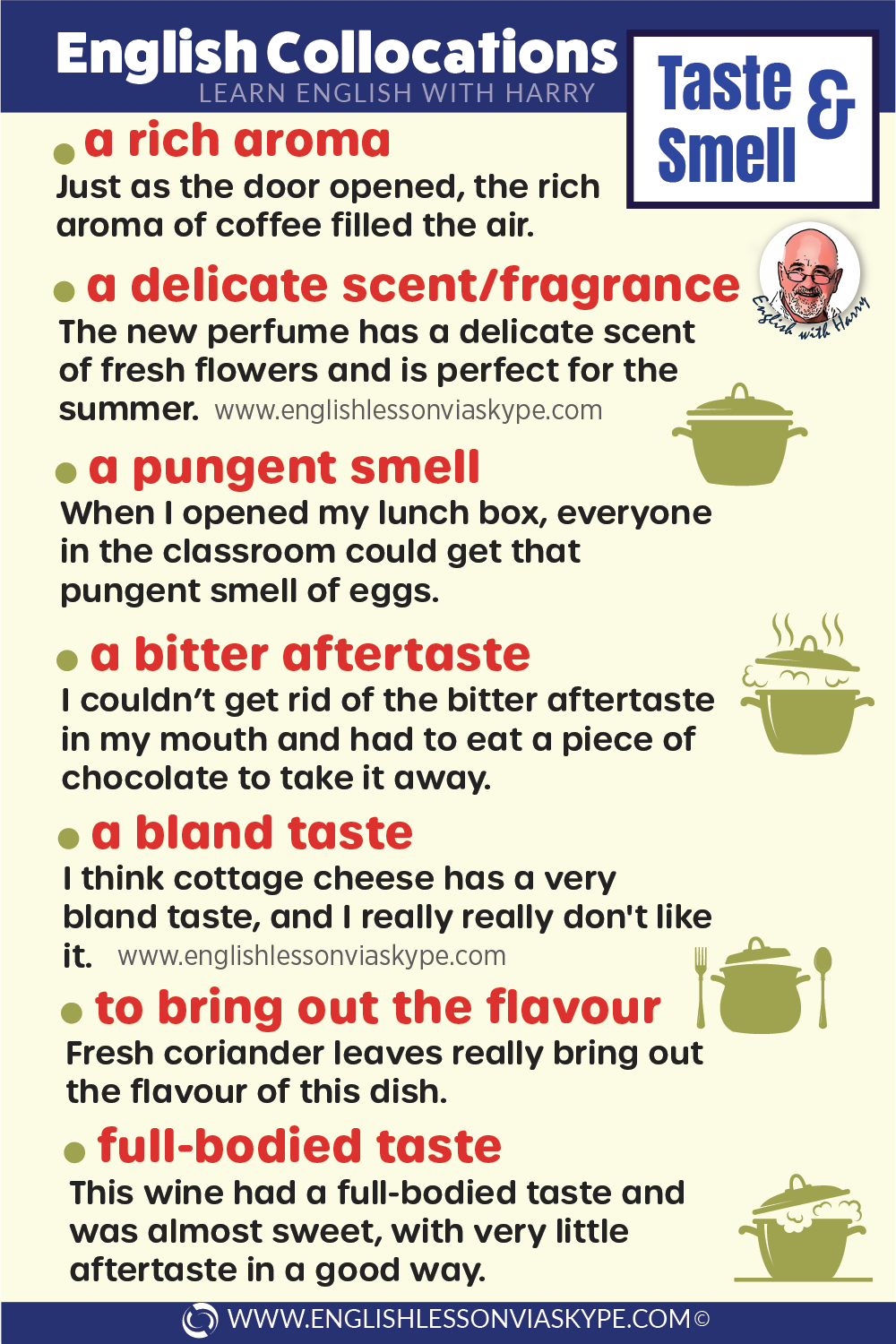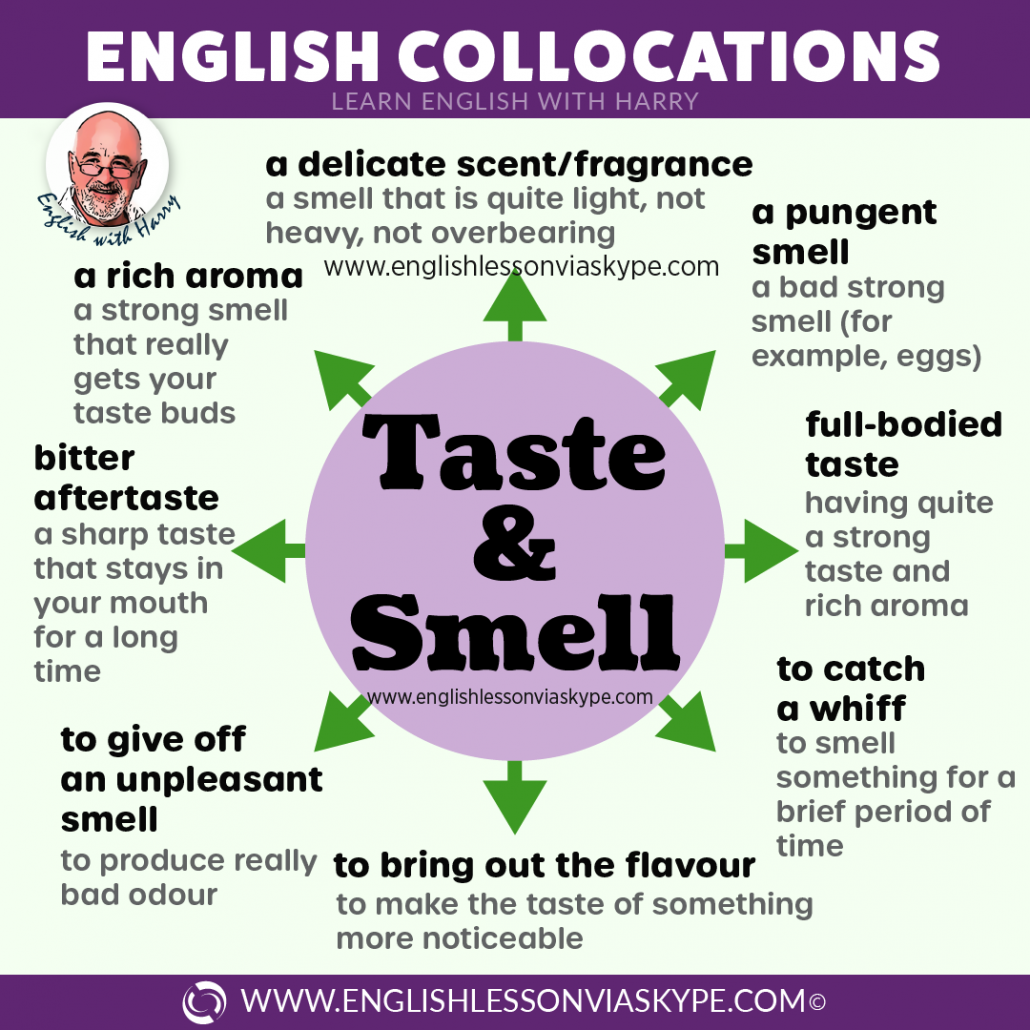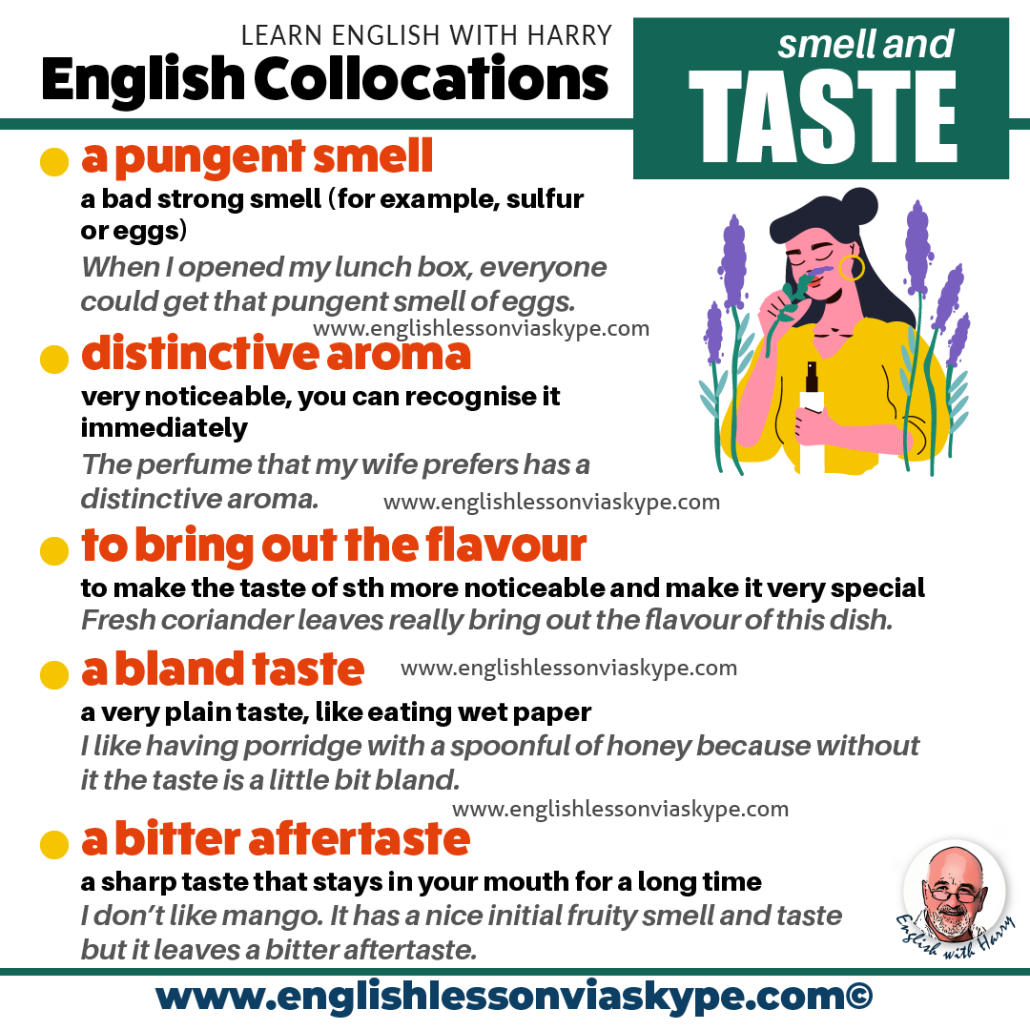Learn English collocations connected with taste and smell and improve your English vocabulary skills.
Collocations are fixed expressions in English and they are a great way to help you sound more natural and native when speaking in English.
Listen to the podcast Speak Better English with Harry or watch it on YouTube at Learn English with Harry. englishclass101
List of collocations related to taste
Harry
English collocations connected with taste and smell
Hi there, this is Harry and welcome back to my English learning podcast Speak Better English where I try to give you a better understanding of the English language. So that you can improve your conversational English, improve your possibilities and potential for getting that dream job, improve your business English, or whatever it might be.
If there’s anybody you think will enjoy our podcast, please give them the details.
Today, we’re going to look at collocations, and we’re going to look at English collocations connected with taste and smell.
Beat inflation summer offer up to 50% off
The smart way to improve your English. Use code SUMMER22.
We hear a lot about taste and smell these days in relation to Covid. They say it’s one of the signs that people have if they’ve got Covid. They lose their sense of taste and their sense of smell.
This is really sad because the two great pleasures are to smell something nice (well, also smell something not so nice!) or taste something really special.
a delicate scent or fragrance
Meaning: a smell that is quite light, not heavy, not overbearing; a smell that reminds you of early spring or early summer
Example:
The new perfume has a delicate scent of fresh flowers and is perfect for the summer.
a rich aroma
Meaning: a strong smell that really gets your taste buds
Example:
Just as the door opened, the rich aroma of coffee filled the air.

The next is a very opposite expression:
a pungent smell
Meaning: a bad strong smell (for example, sulfur or eggs)
Examples:
In the middle of last summer, the neighbours reported a pungent smell that was coming from an unoccupied house at the end of the street.
When I opened my lunch box, everyone in the classroom could get that pungent smell of eggs.
Examples of pungent smell:
- rotten eggs
- burning rubber
- gas
- blue cheese
- sweat
a bitter aftertaste
Meaning: a sharp taste that stays in your mouth for a long time
Example:
I couldn’t get rid of the bitter aftertaste in my mouth and had to eat a piece of chocolate to take it away.
English collocations connected with taste and smell

Share and help other students to improve English language skills.
a bland taste
Meaning: a very plain taste, without any spices, salt, pepper, or additives; like eating wet paper
Example:
I think cottage cheese has a very bland taste, and I really really don’t like it.
I like having porridge with a spoonful of honey because without it the taste is a little bit bland.
to bring out the flavour
Meaning: to make the taste of something more noticeable and make it very special
Example:
Fresh coriander leaves really bring out the flavour of this dish.
Two spoonfuls of honey will bring out the flavour of the porridge and make it a nice tasty healthy breakfast.
English collocations connected with taste and smell
to have a keen sense of smell
Meaning: to be able to smell something and recognise differences between complex odours
Example:
The authorities use sniffer dogs in airports because they have a keen sense of smell.
full-bodied taste
Meaning: having quite a strong taste and rich aroma; we often use this expression when we describe wine, tea, coffee, beer, sauce, etc
A full-bodied taste of something is quite strong, something not light and probably the opposite of a delicate scent.
Example:
This wine had a full-bodied taste and was almost sweet, with very little aftertaste in a good way.
English collocations connected with taste and smell

to give off an unpleasant smell
Meaning: to produce a really bad odour
Example:
A half-eaten sandwich that had fallen behind the bed was giving off an unpleasant smell.
to catch a whiff
Meaning: (informal) to smell something for a brief period of time, for example as you walk past someone or something
We can use it in both positive and negative meanings.
Examples:
When I got out of the door, I caught a whiff of coffee and freshly baked buns from a bakery on the corner.
I caught a whiff of pizza from the kids’ bedroom. And there they were, tucking into their favourite pepperoni.
When I walked past my son’s bedroom, I caught a whiff of his dirty clothes on the floor.
So here are 10 English collocations connected with smell and taste:
- a delicate scent/fragrance
- a rich aroma
- a pungent smell
- a bitter aftertaste
- a bland taste
- to bring out the flavour
- to have a keen sense of smell
- full-bodied taste
- to give off an unpleasant smell
- to catch a whiff
That’s my English lesson for today.
If you want to contact me, you can do so at englishlessonviaskype.com
Always happy to hear from you. Thanks for listening; join me again soon.
speak better English with Harry podcast- episode 392
more information
For more information on English grammar rules, English collocations and English idioms, check out the links below:
English vocabulary related to DIET
English verbs connected with EATING
Don’t forget to check out intermediate and advanced English lessons as Learning English with the BBC.
You will love these English lessons

Memory Related Vocabulary
What memory-related vocabulary words can you think of? How and in what circumstances do you use them? In this post,


20 Advanced English Verbs For Total Fluency
Learn 20 advanced English verbs for total fluency. Build your vocabulary and speak like a native with 20 advanced C1


14 Phrasal Verbs With Fall With Meanings
In this post you will learn 14 Phrasal Verbs with FALL with meanings and examples. Scroll down to watch a